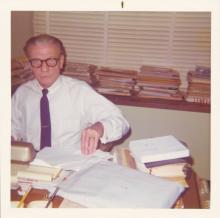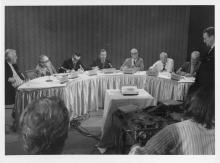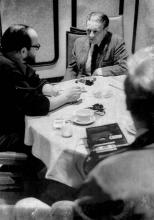Collection Paragraphs
Whatever Became of the Daring Aviator
If the desire to gamble yourself into insolvency should ever take you to the improbable town of Las Vegas, Nevada, you are very likely one day to come across the following scene:
You will see a lean, weary man, six feet three inches tall, dressed in dark nondescript trousers and a white shirt open at the throat, glumly eating steak and salad at a table in the bar of a gaudy hotel. Surrounded by an atmosphere of high-living and wealth, he will look as if he hasn't two silver dollars to rub against one another in his pocket...
The man is Howard Robard Hughes. You may be sure it is no other. There is only one Howard Hughes.
A few weeks ago, in Las Vegas , a woman approached Hughes's table with her eight-year old daughter, and asked him for his autograph. As Hughes amiably scribbled it out she said gratefully, "My daughter will be so happy to have the autograph of the man who employs all those famous actresses." Hughes finished writing then followed the woman with his eyes until she disappeared in the crowd. "I wonder," he said pensively, "whatever became of Howard Hughes, the daring aviator?"
Draft of Stephen White's, "The Howard Hughes Story," published in Look Magazine, February 9, 1954. UNLV Special Collections, Howard Hughes Collection...

Carl Byoir and Associates, a large Los Angeles public relations firm, numbered among its accounts prominent celebrities and corporations, but the firm’s most challenging and demanding client was no doubt Howard Hughes. In 1996, Special Collections acquired from the Howard Hughes Corporation in Las Vegas the Hughes account and reference files of Dick Hannah, the Byoir Vice President and account executive who handled Howard Hughes’s publicity. Like other Hughes agents, Hannah did far more than his title would imply. He not only directed public relations by drafting countless news releases and preparing mountains of press kits with sets of “authorized” photos, he gathered enormous amounts of information concerning what was written about Hughes or about subjects in which Hughes had interest. Hannah’s job for Hughes was to control the public image of Howard Hughes and his far-flung business and political interests, and to monitor the press for any report of Hughes himself or of anything in which he might have an interest or feel threatened.
The timesheets, which Hannah carefully prepared for billing, document his multifarious and sometimes unconventional activities on behalf of his client:
December, 1950: "Activities on behalf of Hughes Tool Company in connection with reading, clipping, and filing articles appearing in newspapers, general magazines, and trade periodicals; obtaining and analyzing pertinent reports published by government and private sources."
December 18, 1950: "Working with national magazine pulling through article on bachelors, making sure Mr. Hughes would get proper full-page first in layout position and was favorably represented."
January 24 and 26, 1950: "Preparation of a report on the sponsorship, activities and reputation of a woman's organization, at request of client."

April 19, 20, 23, 1951: "Preparing a special report on the activities, reputation and financial support given the National Association of Colored People, at request of client."
November, 1951: "Working with editors of a national news magazine concerning one of their writers and the general, over all management of the magazine. Relaying information to the west coast."
April 1, 1952: "Working with editorial writer of New York daily newspaper on background material for an editorial on Mr. Hughes's fight against communism in the motion picture industry."
July 24-25, 28, 1952 - 8 hours: "At request of account, checking back-issue newspapers for reviews of a certain musical show, and sending a report to the west coast."
In 1968 Hannah's report on the Hughes Account had a heading "Special Work for Hughes Office -- Purpose: This includes a great many miscellaneous matters, some important some not so important but regarded by Howard Hughes as the most important function we perform."
The September 1970 report stated: "Hannah has been spending good portion of time handling 'special research projects' for client execs, notable Bill Gay, and to a lesser degree recently Bob Maheu. These involve tracking down a wide variety of rumors, keeping on top of lawsuits and possible lawsuits (usually with Chester Davis), and working on diverse matters at client request, some of which defy brief description . . ."
February 25, 1972: "Screening one hour version of 1970 Master's Golf Tournament to ascertain occurrence of specific incident as to play by Jack Nichlaus at client's request. Double checking all Nichlaus sequences in final round of tournament; notifying client representative as to findings."
This collection of over 100 cubic feet is the single most comprehensive collection documenting the press coverage of Hughes, and how that coverage was managed and controlled. But beyond that, as an integral part of Hughes enormous information-collecting operation, it also documents what interested Hughes. The collection also contains most of the official Howard Hughes photographs which Hughes authorized for use by his public relations machine. It was one of the many paradoxes of Howard Hughes that a man so paranoid and obsessed with avoiding the public eye was such a master of public relations. Not since Louis XIV has a public figure gone to such lengths to control the public's perception of himself.

The most immediately revealing and compelling documentation of Howard Hughes's Las Vegas years remains the mysterious trunk of memos, which form the basis of Michael Drosnin's Citizen Hughes. The documentation left by Dick Hannah, on the other hand, is less revealing of Hughes the man, but reveals much about the Hughes operation, driven by paranoia and the compulsion to know and to control. Hannah's operation monitored and analyzed the press and public perception, and devised the spin. Much of it is simply the grist of the clipping services: boxes of clippings on the construction and "flight" of the Spruce Goose, or publicity for Hughes's RKO films. There are also files on the Las Vegas properties, and press reports on things that might affect or threaten Hughes -- from the Atomic Energy Commission; to Clifford Irving; to the Mafia; to the Watergate Hearings; to any writer, journalist, or television producer who attempted to portray Howard Hughes. One of Hannah's most problematic challenges was the persistent rumor that his client was in fact dead.
The Maheu affair generated boxes of files in Hannah's office. The coup that ousted Robert Maheu from head of Hughes's Nevada Operation generated lawsuits and countersuits for libel and intensified the interest in the press about Hughes mysterious Nevada Operation. In the files are annotated transcripts of depositions, press conferences, and from the "60 Minutes" program in which Morley Shafer investigated why the Hughes Las Vegas properties were losing money. Who was stealing from whom within the Hughes camp was a compelling news story, almost as compelling as Watergate and Hughes's connections with Bebe Rebozo. As the Byzantine maneuvers for control of the Hughes Empire unfolded, Dick Hannah quietly carried on his business.
Control of the Hughes Image reached bizarre proportions when Chester Davis, Hughes's Wall Street lawyer, vice president and chief counsel for Hughes Tool Company, created Rosemont Enterprises, Inc., a Hughes subsidiary whose sole purpose was to control all literary material past, present, and future about Howard Hughes. Staff were hired who located and inventoried all known stories published about Hughes anywhere, or any newsreel footage that existed. They tried to acquire exclusive rights over all footage and photographs. Through a network of informants, any writer researching or writing a piece on Hughes was reported to the Rosemont 'office,' in other words, to Bill Gay at the Romaine Street headquarters in Los Angeles. The writer would be investigated, contacted, informed that Rosemont had been granted by Hughes exclusive rights to his image and biography and would offer payment to the writer for exclusive rights to 'develop and exploit' the writer's material. If a writer could not be bought off, lawsuits were threatened against writer, editor and publisher. The Rosemont files contain investigative reports on a number of journalists as well as a number of unpublished pieces, some transparently fictionalized, about Hughes, for which the writer had accepted payment from Rosemont. Acquisition was not really intended for development, but for suppression.
The extent to which Hughes would go to suppress stories about himself and how violently he hated such intrusions into his privacy can be illustrated by his handling of a story Life Magazine ran on him in 1962. Hughes was at the time enmeshed in litigation over his handling of TWA Airlines, and was particularly sensitive about publicity, although he was willing to offer to the magazine interviews by members of his staff and even his wife, Jean Peters, as a ploy to postpone or control the spin of the story. He sent his lawyer Guy Bautzer, his PR agent Dick Hannah, and a very influential Washington lawyer named Clark Clifford to 'discuss' the story with the magazine and try to convince the magazine to kill the story or at least allow Hughes final approval. Life magazine was not to be intimidated by Mr. Hughes and the story ran. Afterwards Clark Clifford somewhat disingenuously offered his opinion that the story was "helpful," although Robert Maheu, who forwarded Clifford's letter to Bill Gay, did not agree. The failure of his agents to quash the story infuriated Hughes, who vented his anger on Guy Bautzer, a suave big name Hollywood attorney who was probably used to his client's outbursts.
"Please give me an immediate brief reply to each of these points," Hughes wrote to Bautzer, "but let me say beforehand I desire a conversation with you this weekend, which I hope can be in person, and the purpose of this conversation will be to work out a better understanding between us. From the looks of things, it would be difficult to conceive how we could have brought our present relationship to a much more bitter and antagonistic status, I was so upset following our last conversation before my health commenced to recover from the ill effects of my loss of temper and explosion of blood pressure it brought our conversation to a conclusion. I am sure that, like everyone else, it is my tendency to see controversial matters from my side, but perhaps it is your nature, likewise, to look at things from your side.
Now I criticize you for seeming to be more interested in the management of Northeast Airlines than in anything else. You again answer, 'I am doing a great job.' What good is a great job to me if it benefits Northeast Airlines, which I may only possess for another month at most and when Northeast Airlines is not the place where I desire you to direct your efforts when it is Life Magazine and three or four other situations which are cutting into my body like a knife and destroying my efforts to recover my health and putting me daily closer to the grave with unbelievable rapidity and force. Your great job for Northeast Airlines might as well be a great job for Henry Kaiser in Honolulu, when I am about to be crucified and I would say it is an even money bet that they will cause Jean {Peters, a.k.a. Mrs. Howard Hughes] to take the same route as Marilyn Monroe.
Under these circumstances you may understand why even one minute of effort on your part devoted to Northeast Airlines evokes my extreme bitterness when I feel that time and that effort should have gone to Life Magazine.
I await your reply. I don't know if I will be able to answer this morning as I am about at the end of a rope."
